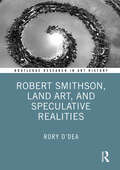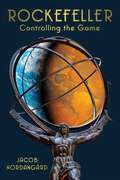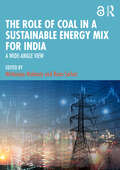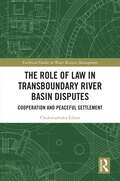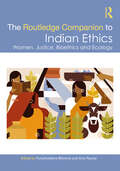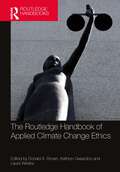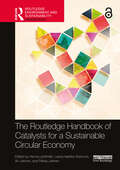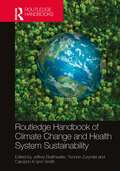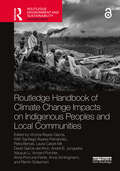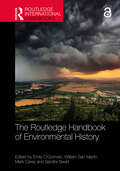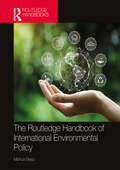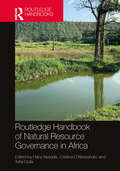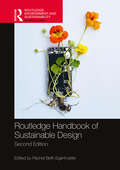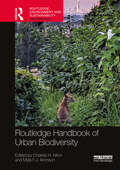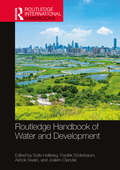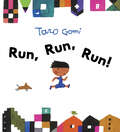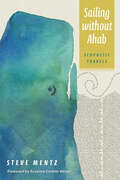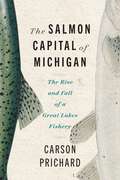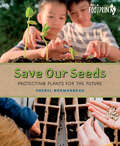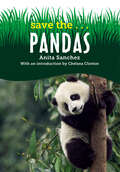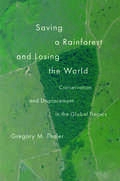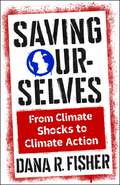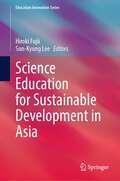- Table View
- List View
Robert Smithson, Land Art, and Speculative Realities (Routledge Research in Art History)
by Rory O'DeaThis book explores the ways Robert Smithson’s art revealed and defamiliarized the constructs of rational reality in order to allow radically speculative alternatives to emerge. In this way, his art is conceived as a true fiction that eradicates a false reality. By tracing the web of correspondences between Smithson and science fictional, speculative and mystical modes of thought, Rory O’Dea explores the aesthetic encounters engendered by his art as a means to warp the contours of reality and loosen the boundaries of being human. Given the current and impending catastrophes of the Anthropocene, which represents the ever-expanding planetary shadow cast by humanism, the possibility of being other-than-human posited by Smithson’s art is a matter of urgent concern. The book will be of interest to scholars working in art history, contemporary art, American studies and environmental humanities.
Rockefeller: Controlling the Game
by Jacob NordangårdWhy would the first family of oil so ardently support environmental climate research and activism? Join author and researcher Jacob Nordangård as he uncovers the whole sordid truth. The Rockefeller family is one of the richest in the world. Yet, why would the family that made the world dependent on oil fund environmental and climate research since the 1950s, help shape climate policy measures since the 1980s, and supported climate activism since the 1990s? Rockefeller: Controlling the Game is the thrilling and paradoxical story of one of the world's most influential global players. Through its top position in American business, close contacts with the White House, and with their immense financial power as one of the world's leading private research funders, the Rockefellers have been able to anchor the climate issue both scientifically and politically. Yet what is the reasoning behind doing so? Author and researcher Jacob Nordangård follows the family from the founding of Standard Oil and the Rockefeller Foundation, up through the aftermath of the Paris Agreement, with the declaration of the Fourth Industrial Revolution in January 2016, to the present day. Nordangård's in-depth research includes the large quantities of new material recently made available on the Internet, as well as the Rockefeller Foundation's own annual reports. Nordangård's main focus is the Rockefeller family's involvement in climate research and politics, but the actions and motives of some of their allies are also explored, as well as the family's influence on the development of modern medicine, family planning, agriculture, art, architecture, behavioral science, information technology, and politics. The Rockefeller family's utopian dream of a perfect world will have serious consequences for the survival of the human species and life as we know it. The Rockefeller Foundation's stated mission to "promote the well-being of humanity throughout the world" has a dark flipside, as, Nordangård will prove, the Rockefeller family's long-standing battle against climate change contains elements of sophisticated propaganda techniques, futurism, and New Age philosophy, aiming at a complete transformation of the whole earth system, including economy, ecology, culture, and even humanity itself.
The Role of Coal in a Sustainable Energy Mix for India: A Wide-Angle View
by Mritiunjoy Mohanty and Runa SarkarAs India switches away from a coal-based to a more sustainable energy use pattern, which pathway will it adopt? What is the nature of challenges that it will face, and who will be affected? Who will gain? This volume offers insights into the steps and challenges involved in this transition and addresses some urgent questions about the possible pathways for India’s renewable energy generation. Including contributions from researchers, policymakers, and practitioners, it draws on different disciplines, ranging from science and technology to economics and sociology, and situates the issue of low carbon transition within an interdisciplinary framework. India has committed to gradual decarbonisation of its economy. This book takes this as its starting point and uses a wide-angle lens, incorporating macro as well as micro views, to understand the possible next steps as well as trade-offs that will inevitably be posed. It incorporates the perspectives of all stakeholders ranging from central and state governments, public and private sector firms, on the one hand, to individuals and local communities, on the other, to explore their role in the transition, their interests, and how these will change and evolve. This timely volume will be of interest to students and researchers of environmental studies, development studies, environmental economics, political studies, and Asian studies. It will also be useful to academics, practitioners, and policymakers working on issues related to climate change, sustainable development, energy policy and economics,and public policy.
The Role of Law in Transboundary River Basin Disputes: Cooperation and Peaceful Settlement (Earthscan Studies in Water Resource Management)
by Chukwuebuka EdumThis book examines the role legal rules play in the resolution of disputes in transboundary river basins. When states fail to resolve disputes over shared water resources, many cast such failures on inadequate or ineffective legal rules. With this view in mind, this book examines the role that legal rules do, and can, play in aiding the peaceful settlement of disputes and furthering cooperation between different parties. Building on the interactional theory of law, this book formulates three analytical frameworks: the effect of norm-generating processes, the effects of water-related agreements and/or arrangements in the basins, and the effect of international water. It uses these frameworks to assess the role of law in the processes of cooperation and peaceful settlement of disputes on transboundary river basin by drawing on four illustrative case studies: the Jordan River Basin, the Nile River Basin, the Mekong River Basin, and the Indus River Basin. In doing so, this book presents a unique perspective on the multi-functional role of legal rules in those processes. Tapping into the global discussion on water security and water-related conflicts, this book stimulates readers to explore broader or interdisciplinary perspectives for understanding water-related issues. This book will be of great interest to students and scholars interested in water resource management, water law, environmental politics, conflict resolution, and sustainable development more generally.
The Routledge Companion to Indian Ethics: Women, Justice, Bioethics and Ecology
by Purushottama Bilimoria Amy RaynerThis companion volume focuses on the application and practical ramifications of Indian ethics. Here Indian dharma ethics is moved from its preeminent religious origins and classical metaethical proclivity to, what Kant would call, practical reason – or in Aristotle’s poignant terms, ēhikos and phronēis –and in more modern parlance normative ethics. Our study examines a wide range of social and normative challenges facing people in such diverse areas as women’s rights, infant ethics, politics, law, justice, bioethics and ecology. As a contemporary volume, it builds linkages between existing theories and emerging moral issues, problems and questions in today’s India in the global arena. The volume brings together contributions from some 40 philosophers and contemporary thinkers on practical ethics, exploring both the scope and boundaries or limits of ethics as applied to everyday and real-life concerns and socio-economic challenges facing India in the context of a troubled globalizing world. As such, this collection draws on multiple forms of writing and research, including narrative ethics, interviews, critical case studies and textual analyses.The book will be of interest to scholars, researchers and students of Indian philosophy, Indian ethics, women and infant issues, social justice, environmental ethics, bioethics, animal ethics and cross-cultural responses to dominant Western moral thought. It will also be useful to researchers working on the intersection of Gandhi, sustainability, ecology, theology, feminism, comparative philosophy and dharma studies.
The Routledge Handbook of Applied Climate Change Ethics (Routledge Handbooks in Applied Ethics)
by Donald A. Brown Kathryn Gwiazdon Laura WestraThe Routledge Handbook of Applied Climate Change Ethics is a powerful reference source for the identification and exploration of the underlying ethical issues in climate change law and policy. Bridging theory with practice, it takes ethical engagement out of the classroom and into the halls of governance. The Handbook‘s 39 chapters--written by a diverse and inter-disciplinary team of experts from around the world--are case studies divided into five parts. Parts I-IV highlight the ethical issues that arise in climate change policy formation, from duties not to harm to duties to consider the views and voices of those who will be, or are being, harmed; from the role of human rights, justice, and democracy to how to identify and respond to disinformation and denialism. It also raises the ethics of various policy responses, such as cap-and-trade, carbon taxing, and geo-engineering. Part V offers a way forward, with strategies on how to expressly consider ethics in climate change policy formation, from negotiations to education, media, communication, and the power and potential of shaming. The volume is essential reading for students, professors, and practitioners who wish to better engage with government and non-government organizations on climate policy, to better understand the practical application of the theory and philosophy of ethics, and how to more strongly draft and defend ethical action in negotiating, drafting, and defending climate change law and policy.
The Routledge Handbook of Catalysts for a Sustainable Circular Economy (Routledge Environment and Sustainability Handbooks)
by Hanna Lehtimäki Leena Aarikka-Stenroos Ari Jokinen Pekka JokinenThis groundbreaking handbook leads the way in accelerating the transition to a sustainable circular economy by introducing the concept of a catalyst as a positive and enhancing driving force for sustainability. Catalysts create and maintain favourable conditions for complex systemic sustainability transition changes, and a discussion and understanding of catalysts is required to move from a linear economy to a sustainable and circular economy. With contributions from leading experts from around the globe, this volume presents theoretical insights, contextualised case studies, and participatory methodologies, which identify different catalysts, including technology, innovation, business models, management and organisation, regulation, sustainability policy, product design, and culture. The authors then show how these catalysts accelerate sustainability transitions. As a unique value to the reader, the book brings together public policy and private business perspectives to address the circular economy as a systemic change. Its theoretical and practical perspectives are coupled with real-world case studies from Finland, Italy, China, India, Nigeria, and others to provide tangible insights on catalysing the circular economy across organisational, hierarchical, and disciplinary boundaries. With its broad interdisciplinary and geographically diverse scope, this handbook will be a valuable tool for researchers, academics, and policy-makers in the fields of circular economy, sustainability transitions, environmental studies, business, and the social sciences more broadly.
The Routledge Handbook of Catalysts for a Sustainable Circular Economy (Routledge Environment and Sustainability Handbooks)
by Hanna Lehtimäki Leena Aarikka-Stenroos Ari Jokinen Pekka JokinenThis groundbreaking handbook leads the way in accelerating the transition to a sustainable circular economy by introducing the concept of a catalyst as a positive and enhancing driving force for sustainability. Catalysts create and maintain favourable conditions for complex systemic sustainability transition changes, and a discussion and understanding of catalysts is required to move from a linear economy to a sustainable and circular economy.With contributions from leading experts from around the globe, this volume presents theoretical insights, contextualised case studies, and participatory methodologies, which identify different catalysts, including technology, innovation, business models, management and organisation, regulation, sustainability policy, product design, and culture. The authors then show how these catalysts accelerate sustainability transitions. As a unique value to the reader, the book brings together public policy and private business perspectives to address the circular economy as a systemic change. Its theoretical and practical perspectives are coupled with real-world case studies from Finland, Italy, China, India, Nigeria, and others to provide tangible insights on catalysing the circular economy across organisational, hierarchical, and disciplinary boundaries.With its broad interdisciplinary and geographically diverse scope, this handbook will be a valuable tool for researchers, academics, and policy-makers in the fields of circular economy, sustainability transitions, environmental studies, business, and the social sciences more broadly.The Open Access version of this book, available at http://www.taylorfrancis.com, has been made available under a Creative Commons Attribution-Non Commercial-No Derivatives (CC-BY-NC-ND) 4.0 license.
Routledge Handbook of Climate Change and Health System Sustainability
by Jeffrey Braithwaite Yvonne Zurynski Carolynn K-lynn SmithThe Routledge Handbook on Climate Change and Health System Sustainability takes the reader on a journey to understand the interconnectedness of human health, climate change, and healthcare systems.The book begins by exploring how climate change is affecting human health through the increasing frequency of natural disasters, such as bush fires, droughts and heatwaves, and the emergence of new infectious diseases, such as the SARS-CoV2 virus, all of which drive up demand for health services that are already heavily burdened by increasing rates of chronic diseases and ageing populations. Chapters then turn to the contribution of the healthcare system itself to climate change— explaining how current clinical practices, including wasteful care of low value, create an unsustainable carbon footprint and threaten the very viability of healthcare systems. Throughout the volume, descriptions of practical solutions and implemented case studies are used to illustrate the feasibility of taking action in the real world of the healthcare delivery ecosystem.Bringing together a mix of forward-thinking environmental and health researchers, policymakers, leaders, managers, clinicians, patients, and health industry leaders to clarify the current state and future of sustainable healthcare systems, this book will be of interest to researchers and policymakers of climate and health systems.
Routledge Handbook of Climate Change Impacts on Indigenous Peoples and Local Communities (Routledge Environment and Sustainability Handbooks)
by Victoria Reyes-GarcíaThis Handbook examines the diverse ways in which climate change impacts Indigenous Peoples and local communities and considers their response to these changes. While there is well-established evidence that the climate of the Earth is changing, the scarcity of instrumental data oftentimes challenges scientists’ ability to detect such impacts in remote and marginalized areas of the world or in areas with scarce data. Bridging this gap, this Handbook draws on field research among Indigenous Peoples and local communities distributed across different climatic zones and relying on different livelihood activities, to analyse their reports of and responses to climate change impacts. It includes contributions from a range of authors from different nationalities, disciplinary backgrounds, and positionalities, thus reflecting the diversity of approaches in the field. The Handbook is organised in two parts: Part I examines the diverse ways in which climate change – alone or in interaction with other drivers of environmental change – affects Indigenous Peoples and local communities; Part II examines how Indigenous Peoples and local communities are locally adapting their responses to these impacts. Overall, this book highlights Indigenous and local knowledge systems as an untapped resource which will be vital in deepening our understanding of the effects of climate change. The Routledge Handbook of Climate Change Impacts on Indigenous Peoples and Local Communities will be an essential reference text for students and scholars of climate change, anthropology, environmental studies, ethnobiology, and Indigenous studies.
Routledge Handbook of Climate Change Impacts on Indigenous Peoples and Local Communities (Routledge Environment and Sustainability Handbooks)
by Victoria Reyes-GarcíaThis Handbook examines the diverse ways in which climate change impacts Indigenous Peoples and local communities and considers their response to these changes.While there is well-established evidence that the climate of the Earth is changing, the scarcity of instrumental data oftentimes challenges scientists’ ability to detect such impacts in remote and marginalized areas of the world or in areas with scarce data. Bridging this gap, this Handbook draws on field research among Indigenous Peoples and local communities distributed across different climatic zones and relying on different livelihood activities, to analyse their reports of and responses to climate change impacts. It includes contributions from a range of authors from different nationalities, disciplinary backgrounds, and positionalities, thus reflecting the diversity of approaches in the field. The Handbook is organised in two parts: Part I examines the diverse ways in which climate change – alone or in interaction with other drivers of environmental change – affects Indigenous Peoples and local communities; Part II examines how Indigenous Peoples and local communities are locally adapting their responses to these impacts. Overall, this book highlights Indigenous and local knowledge systems as an untapped resource which will be vital in deepening our understanding of the effects of climate change.The Routledge Handbook of Climate Change Impacts on Indigenous Peoples and Local Communities will be an essential reference text for students and scholars of climate change, anthropology, environmental studies, ethnobiology, and Indigenous studies.The Open Access version of this book, available at www.taylorfrancis.com, has been made available under a Creative Commons Attribution-Non Commercial-No Derivatives (CC-BY-NC-ND) 4.0 license.
The Routledge Handbook of Environmental History (Routledge International Handbooks)
by Emily O’Gorman William San Martín Mark Carey Sandra SwartThe Routledge Handbook of Environmental History presents a cutting-edge overview of the dynamic and ever-expanding field of environmental history. It addresses recent transformations in the field and responses to shifting scholarly, political, and environmental landscapes. The handbook fully and critically engages with recent exciting changes, contextualizes them within longer-term shifts in the field, and charts potential new directions for study. It focuses on five key areas: Theories and concepts related to changing considerations of social justice, including postcolonial, antiracist, and feminist approaches, and the field’s growing emphasis on multiple human voices and agencies. The roles of non-humans and the more-than-human in the telling of environmental histories, from animals and plants to insects as vectors of disease and the influences of water and ice, the changing theoretical approaches and the influence of concepts in related areas such as animal and discard studies. How changes in theories and concepts are shaping methods in environmental history and shifting approaches to traditional sources like archives and oral histories as well as experiments by practitioners with new methods and sources. Responses to a range of current complex problems, such as climate change, and how environmental historians can best help mitigate and resolve these problems. Diverse ways in which environmental historians disseminate their research within and beyond academia, including new modes of research dissemination, teaching, and engagements with stakeholders and the policy arena. This is an important resource for environmental historians, researchers and students in the related fields of political ecology, environmental studies, natural resources management and environmental planning. Chapters 9, 10 and 26 of this book are freely available as a downloadable Open Access PDF at http://www.taylorfrancis.com under a Creative Commons Attribution-Non Commercial-No Derivatives (CC-BY-NC-ND) 4.0 license.
The Routledge Handbook of International Environmental Policy
by Mahua BasuThis handbook is a one-stop, comprehensive guide to global initiatives for climate action. It examines policies to tackle climate change and the critical role various organizations play.The volume: Includes in-depth discussion of individual issues related to the environment Highlights global initiatives, negotiations, and international organizations responsible for climate action, protecting marine and freshwater environment, protecting atmosphere and climate, conserving biological diversity, chemicals and wastes management, environmental governance, safeguarding against warfare and disasters Debates on-ground implications of the international policies for the Global South Brings together case studies from across the world Presents a toolkit for environment practitioners to seek sustainable and practicable solutions to problems Includes suggested readings for researchers Brings together primary documents, supportive illustrations, graphs, and maps The handbook will be an essential reference for scholars and researchers of environmental studies, environmental policy and governance, sustainability and resilience. It will also be indispensable for policy makers, think tanks and NGOs.
Routledge Handbook of Natural Resource Governance in Africa
by Hany Besada, Cristina D’Alessandro and Tefsi GollaThe Routledge Handbook of Natural Resource Governance in Africa provides a comprehensive analysis of African natural resource governance, stretching across the continent, and encompassing water, land, extractive resources, and mining.Africa’s natural resources are not only crucial for the continent from an economic, environmental, and political perspective, but they are also of significant geopolitical importance, with direct implication for meeting the global challenges outlined in the Sustainable Development Goals. Whether an abundance of natural resources proves to be a curse or a blessing depends on the nature, extent, and outcome of the effort and experience of an individual country in governing and managing such assets. It is with this in mind that this ground-breaking handbook brings together experts from across the field of natural resource development to reflect on the varied regime types and paradigms within the continent’s natural resource sectors, the specific challenges they face, and their role within global value chains. The book first considers governance for sustainable development and discourses of land and development financing, before going on to investigate the regulatory and policy impacts, and socioeconomic implications of natural resource management. Finally, the Handbook situates the African continent within the emerging global energy transition; examining trends in South-South cooperation, and new frontiers for the harnessing of critical tools in a sustainable future for natural resource governance and management.Overall, the Handbook’s in-depth analysis provides a unique blend of realism and optimism, highlighting the importance of building a new sustainable African resource narrative for shared prosperity. The handbook will be an essential read for researchers and policy makers with an interest in sustainable development and natural resource governance in Africa.
Routledge Handbook of Sustainable Design (Routledge Environment and Sustainability Handbooks)
by Rachel Beth EgenhoeferThe Routledge Handbook of Sustainable Design considers the design, not only of artifacts, but of structures, systems, and interactions in the context of sustaining our shared planet. This revised edition introduces new and updated chapters, as well as a new section on pedagogy for sustainable design. With authors from around the world, design is positioned in context with recent crises such as global pandemics, racial reckoning, political unrest, and natural disasters. Just as design is an interdisciplinary field, the climate crisis is deeply tangled in racial justice, gender justice, global health, economics, trade, and more. Divided into six sections, it presents a holistic approach to understanding the many facets of sustainable design: Part 1: Systems and Design Part 2: Complexities of Sustainable Design Part 3: Community Engaged Design for Local and Global Diversity Part 4: Design for Sustainable Behaviors Part 5: Design Futures Part 6: Pedagogy in Design for Sustainability Arguing that design needs to restore, regenerate, and rejuvenate our planet and people, this handbook will be invaluable to researchers, students, and practitioners across all subdisciplines of design, architecture, business, energy management, visual arts, and environmental studies, among others.
Routledge Handbook of Urban Biodiversity (Routledge Environment and Sustainability Handbooks)
by Charles Nilon Myla F.J. AronsonThis handbook provides a state-of-the-art, comprehensive overview of the expanding field of urban biodiversity. The field of urban biodiversity has emerged from within the broad discipline of urban ecology in the past two decades and is now a significant field in its own right. In view of this, the Routledge Handbook of Urban Biodiversity presents a thorough treatment of this field detailing the history of urban biodiversity, theoretical foundations, current state of knowledge, and application of that knowledge. The handbook is split into four parts: Part I: Setting the Stage for Urban Biodiversity Research and Practice Part II: Foundational Concepts and Theory in Urban Biodiversity Research Part III: Population and Community Ecology of Key Urban Taxa Part IV: Urban Biodiversity Practice: Management, Planning, and Design for Healthy Communities This volume contains interdisciplinary and global contributions from established and early career academics as well as professionals and practitioners, addressing two key fields in urban biodiversity: fundamental research focused on answering questions about the mechanisms explaining the distribution of species among and within cities; and applied research and work by practitioners to address concerns about urban biodiversity conservation, restoration, planning, design, and public involvement. This handbook is essential reading for students, academics, and professionals interested and working in the fields of urban biodiversity, ecology, nature conservation, urban planning, and landscape architecture.
Routledge Handbook of Water and Development (Routledge International Handbooks)
by Sofie Hellberg Fredrik Söderbaum Ashok Swain Joakim ÖjendalWater is essential for human life and at the centre of political, economic, and socio-cultural development. This Routledge Handbook of Water and Development offers a systematic, wide-ranging, and state-of-the-art guide to the diverse links between water and development across the globe. It is organized into four parts: Part I explores the most significant theories and approaches to the relationship between water and development. Part II consists of carefully selected in-depth case studies, revealing how water utilization and management are deeply intertwined with historical development paths and economic and socio-cultural structures. Part III analyses the role of governance in the management of water and development. Part IV covers the most urgent themes and issues pertaining to water and development in the contemporary world, ranging from climate change and water stress to agriculture and migration. The 32 chapters by leading experts are meant to stimulate researchers and students in a wide range of disciplines in the social and natural sciences, including Geography, Environmental Studies, Development Studies, and Political Science. The Handbook will also be of great value to policymakers and practitioners.
Run, Run, Run!
by Taro GomiRun, Run, Run! is a fun, fun, fun board book for on-the-go toddlers!It's time to run a race like no other! Finish line? Winning? None of that matters here. Exploring is the goal! In this colorful board book by bestselling author-illustrator Taro Gomi, follow the racer as he runs far past the finish line and through fields, a farm, a forest, and more. Toddlers will delight in turning the pages to find out where he will run, run, run to next!Ideal for fans of Taro Gomi and his popular children's books, including the classic Everyone Poops, My Friends, Little Truck, and Little Chicks, this board book combines irresistibly expressive artwork and energetic text to create a read-along story parents and kids will not walk but run to read again and again.PERFECT FOR ACTIVE TODDLERS: Not only do toddlers love to run—they love to run everywhere! This spirited board book gives little ones a glimpse of what it's like to run in cities, farms, forests, and more, letting them live out their dreams of running free with the whole world at their feet. It's the ultimate board book adventure!CELEBRATES THE POWER OF IMAGINATION: It's a toddler's dream come true: running (and running) everywhere! The youngest readers will delight in exploring a variety of scenes and reveling in the little racer's ideal race. A GREAT GIFT: This colorful, detail-rich board book is the perfect present for young ones just starting to walk and run. Not only will it inspire them, but it will help to redefine what winning means when experience is the goal! Great for baby shower, new baby, or child's birthday gift giving.Perfect for:Fans of Taro Gomi and Everyone PoopsGift-givers seeking a sweet and engaging board bookParents, grandparents, caregivers, and storytime leaders who love sharing fun stories and vibrant art with babies and toddlersRunners and joggers who want to share their outdoor hobby with the kids in their lives
Sailing without Ahab: Ecopoetic Travels
by Steve MentzJourney through uncharted literary waters and explore Melville’s epic in bold new lightCome sail with I.We’re not taking the same trip, though you might recognize the familiar course. This time, the Pequod’s American voyage steers its course across the curvature of the Word Ocean without anyone at the helm. We are leaving one man and his madness on shore. Our ship overflows with glorious plurality—multiracial, visionary, queer, conflicted, polyphonic, playful, violent. But on this voyage something is different. Today we sail headless without any Captain. Instead of binding ourselves to the dismasted tyrant’s rage, the ship’s crew seeks only what we will find: currents teeming with life, a blue-watered alien globe, toothy cetacean smiles from vasty deeps. Treasures await those who sail without.This cycle of one hundred thirty-eight poems—one for each chapter in Moby-Dick, plus the Etymology, Extracts, and Epilogue—launches into oceanic chaos without the stabilizing mad focus of the Nantucket captain. Guided by waywardness and curiosity, these poems seek an alien ecopoetics of marine depths, the refraction of light, the taste of salt on skin. Directionless, these poems reach out to touch oceanic expanse and depth. It’s not an easy voyage, and not a certain one. It lures you forward. It has fixed its barbed hook in I.Sailing without means relinquishing goals, sleeping at the masthead, forgetting obsessions. I welcome you to trace wayward ways through these poems. Read them any way you can—back to front, at random, sideways, following the obscure promptings of your heart. It’s the turning that matters. It’s a blue wonder world that beckons.
The Salmon Capital of Michigan: The Rise and Fall of a Great Lakes Fishery (Great Lakes Books Series)
by Carson PrichardWeaving together the stories and voices of residents, anglers, community leaders, and environmental workers and researchers, this ethnographic account details the lives and livelihoods impacted by a once-unrivaled Michigan salmon fishery. From the introduction of Chinook salmon to the Great Lakes in the late 1960s, a thriving recreational fishery industry arose in Northern Michigan, attracting thousands of anglers to small towns like Rogers City each week at its peak. By the early 2000s, a crisis loomed beneath the surface of Lake Huron as the population of a prey fish species called alewife unexpectedly collapsed, depleting the salmon’s main source of food. By 2007, the salmon population had collapsed too, leaving local fisheries and their respective communities lacking a key commodity and a bid on fishery tourism. Author, angler, and ecologist Carson Prichard artfully incorporates fisheries science and local news media into an oral history that is entertaining, rich, and genuine. Complementing an ecological understanding of events, this narrative details the significance of the fishery and its loss as experienced by the townspeople whose lives it touched.
Save Our Seeds: Protecting Plants for the Future (Orca Footprints #31)
by Sheryl NormandeauKey Selling Points Learning about the importance of seeds and how to save and conserve them for the future is imperative to sustaining healthy life on the planet. Introduces young readers to STEM concepts, such as pollination, biodiversity, healthy ecosystems, food security, the climate crisis, GMO food and genetic engineering. Gives young readers the practical tools to take action to save seeds in their own lives and communities. The author is a certified master gardener and works with various gardening organizations in Alberta. She has a background in horticulture and urban agriculture and has written a number of nonfiction books for adults and kids.
Save the...Pandas (Save the...)
by Anita Sanchez Chelsea ClintonPandas have rolled and munched their ways into kids' hearts. With this book, readers can become panda experts and learn how to save the animals they love. Featuring an introduction from Chelsea Clinton!Did you know that pandas only live in the wild in China? How about that they are the only species of bear that eats almost nothing but plants? Or that pandas' black and white fur helps them hide in the shadows of their bamboo forests? Perfect for all animal lovers—and panda fans in particular—this book is filled with all the facts you need to know to become a panda expert! Where are pandas found? What's it like to be a panda? Why are pandas endangered, and who has been working hard to save them? Read this book and find out how you can help save the pandas!Complete with black-and-white photographs, a list of fun panda facts, and things that kids can do right this very moment to help save pandas from extinction, this book, with an introduction by animal advocate Chelsea Clinton, is a must for every family, school, and community library.
Saving a Rainforest and Losing the World: Conservation and Displacement in the Global Tropics (Yale Agrarian Studies Series)
by Gregory M. ThalerAn unflinching investigation of the false promises of land sparing, exposing how its illusory successes mask the failures of green capitalism For two decades, the concept of land sparing, the claim that agricultural intensification can spare land by preventing forest clearing for agricultural expansion, has dominated tropical forest conservation. Land sparing policies transform landscapes and livelihoods with the promise of reconciling agricultural development with environmental conservation. But that land sparing promise is false. Based on six years of research on agrarian frontiers in Indonesia, Brazil, and Bolivia, this book traces where and how land sparing becomes policy and charts the social and ecological effects of these political contests. Gregory M. Thaler explains why land sparing appears successful in some places but not in others and reveals that success as an illusion achieved by displacing deforestation to new frontiers. The failure of land sparing exposes a harsh truth behind assurances of green capitalism: capitalist development is ecocide.
Saving Ourselves: From Climate Shocks to Climate Action (Society and the Environment)
by Dana R. FisherWe've known for decades that climate change is an existential crisis. For just as long, we've seen the complete failure of our institutions to rise to the challenge. Governments have struggled to meet even modest goals. Fossil fuel interests maintain a stranglehold on political and economic power. Even though we have seen growing concern from everyday people, civil society has succeeded only in pressuring decision makers to adopt watered-down policies. All the while, the climate crisis worsens. Is there any hope of achieving the systemic change we need?Dana R. Fisher argues that there is a realistic path forward for climate action—but only through mass mobilization that responds to the growing severity and frequency of disastrous events. She assesses the current state of affairs and shows why public policy and private-sector efforts have been ineffective. Spurred by this lack of progress, climate activism has become increasingly confrontational. Fisher examines the radical flank of the climate movement: its emergence and growth, its use of direct action, and how it might evolve as the climate crisis worsens. She considers when and how activism is most successful, identifying the importance of creating community, capitalizing on shocking moments, and cultivating resilience. Clear-eyed yet optimistic, Saving Ourselves offers timely insights on how social movements can take power back from deeply entrenched interests and open windows of opportunity for transformative climate action.
Science Education for Sustainable Development in Asia (Education Innovation Series)
by Hiroki Fujii Sun-Kyung LeeThis book presents an Asian perspective on transformative science education in the context of the United Nations' Sustainable Development Goals (SDGs). The chapters are written by contributors who practiced science education for sustainability in a research project entitled “Teacher Education for ESD in the Asia-Pacific Region” from 2017 to 2019, supported by the Japan Society for the Promotion of Science, and the Japanese National Commission for UNESCO. The book showcases the contributors’ innovations in science education for sustainability, presenting case studies of science teaching and learning, science curriculum and assessment, science education in collaboration with local communities, and science teacher education. Embodying Asian sustainability education paradigms, policies, and practices, these case studies depict the diversity and uniqueness of natural, social, and cultural contexts in Asia, while demonstrating their commonalities. Through examining these case studies, this book aims to provide examples for praxis, and prospects, for new science classes, curricula, and teacher education in implementing education for sustainable development.
